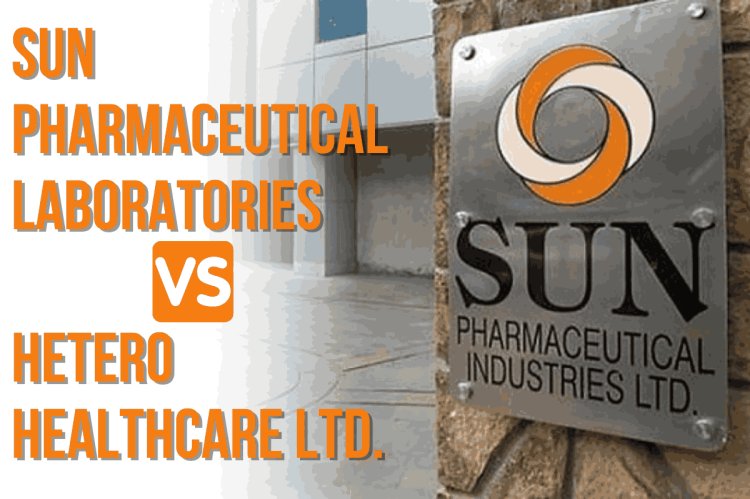Sun Pharmaceutical Laboratories Ltd. v. Hetero Healthcare Ltd. & Anr.
In a recent trademark dispute between Sun Pharmaceutical Laboratories Ltd. (SUN) and Hetero Healthcare Ltd. (HETERO), SUN alleged trademark infringement and passing off by HETERO for using the mark 'LETERO', similar to SUN's registered mark 'LETROZ'. However, the court ruled in favor of HETERO, stating that SUN's mark was deceptively similar to the international non-proprietary name (INN) 'LETROZOLE' and thus could not be registered. This case underscores the importance of thorough trademark examination and protection.

Sun Pharmaceutical Laboratories Ltd. v. Hetero Healthcare Ltd. & Anr.
FAO (COMM) 96/2022,
Decided on 26 August 2022
Facts of the Case:
Sun Pharmaceutical Laboratories Ltd. (SUN), a leading manufacturer of generic medicines, recently filed a lawsuit against Hetero Healthcare Ltd. (HETERO) for allegedly infringing on its trademark and engaging in passing off. SUN had registered the trademark 'LETROZ' for its generic drug that contained the active ingredient 'LETROZOLE.' However, HETERO had been manufacturing a similar drug under the trademark 'LETERO.'
In its petition, SUN sought a permanent injunction to prevent HETERO from using the trademark 'LETERO,' which it claimed was deceptively similar to its registered trademark. However, the Commercial Court dismissed SUN's application for an injunction, stating that there was no deceptive similarity between the trademarks. The court also noted that the prices of the medicines produced by the two companies were significantly different.
Petitioner's Argument:
In a legal dispute, SUN put forward the argument that it held exclusive rights to the registered trademark 'LETROZ'. The defendant, HETERO, was accused of infringing on the trademark by using a similar mark 'LETERO', which could lead to confusion among consumers, thus causing harm to SUN's considerable reputation and goodwill. SUN claimed that HETERO's actions were tantamount to trademark infringement and passing off, and sought legal recourse to protect its trademark rights.
Respondent's Argument:
HETERO is making a claim that the term 'LETROZ' is derived from the international non-proprietary name (INN) called 'LETROZOLE,' which is a common practice in the pharmaceutical industry. They are arguing that SUN cannot have a monopoly on the use of the word 'LETROZ' and that their own mark 'LETERO' is distinctively different. Additionally, they assert that SUN has been aware of HETERO's use of the mark since 2007 and has not opposed it.
Court Judgement:
In a recent legal case, the court referred to Section 13 of the Trade Marks Act, 1999, which outlines that a word that is deceptively similar to an international non-proprietary name (INN) declared by the World Health Organization cannot be registered as a trademark. Specifically, the court examined whether the trademark 'LETROZ' registered by SUN Pharma was deceptively similar to the INN 'LETROZOLE,' and whether SUN's registration gave them exclusive rights over the word 'LETROZ.'
To make this determination, the court analysed the arguments presented by both parties and conducted a thorough examination of the similarities between the trademarks 'LETROZ' and 'LETERO.' The court considered the phonetic, visual, and structural aspects of the marks and assessed their potential to cause confusion among consumers.
Moreover, the court reviewed the pricing and packaging of the medicines, taking into account the specialized nature of the drug, which requires a doctor's prescription. It also examined precedents in similar cases and assessed the balance of convenience.
Overall, the court's decision was based on a comprehensive analysis of all relevant factors, and it concluded that the trademark 'LETROZ' was deceptively similar to the INN 'LETROZOLE,' and therefore could not be registered as a trademark by SUN Pharma.
COURT ANALYSIS:
The court ruled in favour of Hetero Healthcare Ltd. in a trademark case filed by Sun Pharmaceutical Laboratories Ltd. The court found that Sun's trademark 'LETROZ' was deceptively similar to the international non-proprietary name 'LETROZOLE' declared by the World Health Organization. As a result, Sun's exclusive rights over the word 'LETROZ' were not upheld. The case highlights the importance of thorough trademark examination and the need for companies to protect their trademarks.












